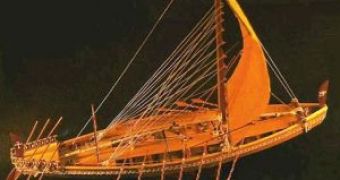Scientists from the Leon Recanati Institute for Maritime Studies of the University of Haifa have discovered the only boat found till now from the 8th century in the whole Mediterranean.
The ship was discovered off Dor Beach and excavated by researchers. "We do not have any other historical or archaeological evidence of the economic activity and commerce of this period at Dor. The shipwreck will serve as a source of information about the social and economic activities in this area," said Dr. Ya'acov Kahanov from the Leon Recanati Institute for Maritime Studies and the Department Of Maritime Civilizations at the University of Haifa.
The wreck itself was first found almost a decade ago by an expedition of the Institute for Maritime Archaeology from the University of Texas A & M and the Recanati Institute for Maritime Studies at the University of Haifa. The boat was dated using carbon techniques, but the digging has been finished only recently.
The small ship, 15 meters long and 5 meters wide, seems to have been used in local commerce in the Levant area (eastern Mediterranean Sea). The ancient boat was lying in a lagoon off Dor Beach, 0.75 meters (2.5 feet) beneath the water surface. This ship is a rare discovery due to the high percentage of wood that has remained in a good state of preservation. Not only the wooden hull of the boat was preserved, but many of the boat's wooden contents have also been kept intact.
Among other findings are 30 vessels of Egyptian pottery of different sizes and designs filled with fish bones, ropes, mats, a bone needle, a wooden spoon, wood carvings and food remains, mostly carobs and olives.
The finding is important because there are so few archaeological finds from the ancient Islamic Period in this area.
The boat could offer an indication that sea trade continued uninterrupted during the Islamic conquest. "If the age of the boat is right, then this is a very important find," said Joseph Drori, an expert on the Islamic period at Bar-Ilan University near Tel Aviv.
"The Muslim population was still small, and most people were Christian, Jewish and Hellenist. The sailors were unlikely to have been Arabs," Drori said.
"The Arabs came with no knowledge of the sea, and drafted craftsmen, sailors and shipbuilders from the local population," Drori said.

 14 DAY TRIAL //
14 DAY TRIAL //